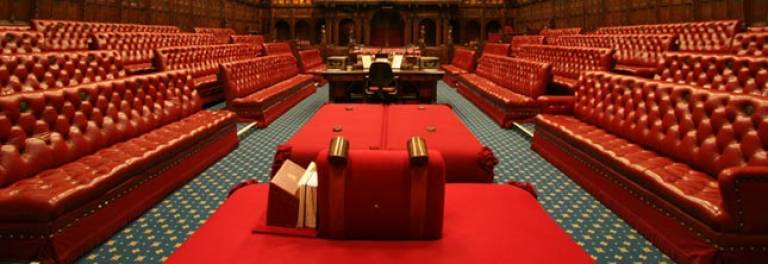Press Release: Cameron faces major challenges in the Lords, warns expert
11 May 2015

As the fallout from the general election is dissected, some commentators have noted the challenges facing Cameron's new government in managing the House of Commons - given his small majority. But UCL expert Professor Meg Russell warns today that his challenges in managing the House of Lords could be even greater.
In a detailed blogpost, Professor Russell - who has studied the Lords and its political dynamics for more than 15 years - notes that now the Liberal Democrats have left government, Cameron will find it much more difficult to get his policies through the Lords. The Conservatives hold less than one third of Lords seats, and therefore face defeat by various combinations of forces. In particular, the Liberal Democrats, while now having only eight MPs, have over 100 peers and are likely to hold the balance of power in the chamber.
Professor Russell comments that "During the Blair and Brown years government defeats in the Lords were commonplace - with over 450 during 1999-2010. In over 90% of cases defeat would have been averted if Liberal Democrat peers had voted differently. Under coalition, Lib Dem peers were expected to support the government, and the number of defeats declined. But now that the Conservatives are governing alone, Lib Dem peers can be expected to frequently side with Labour".
As Russell points out in her piece, this situation has not been helped by David Cameron's unprecedented rate of peerage appointments. She notes that "In five years, David Cameron appointed 40 Liberal Democrat peers, as part of a wrongheaded coalition mission to bring membership of the Lords into line with general election vote shares (which was never achieved). That Cameron went along with this plan may already be a source of regret. If not, it probably will be soon."
Possible flashpoints in the Lords include the government's plans to repeal the Human Rights Act, reform parliamentary boundaries, and legislate for an EU referendum. But numerous other policies may be affected as well. Russell notes that "Looking back to the 2010 parliament it is easy to see examples of policies that might have been scuppered in the Lords had the Liberal Democrats not been in government - the most obvious being NHS reform and university fees."
Yet, as she points out, there is little that Cameron can do to ease this situation. Large numbers of new Conservative appointments would be controversial, and actually breach a Conservative manifesto pledge to "address… the size of the chamber". But the manifesto also ruled out large-scale Lords reform, describing this as "not a priority in the next Parliament". The only real option is for the Cameron government to negotiate with the Lords - as the Blair government was often forced to do.
Russell ends her piece by noting that: "In a way, a new period where the Lords is at the heart of British policy-making could be seen as relatively mundane … a return to the status quo ante [under Blair]. But at another level, it is momentous - because it is now the Conservatives, not Labour, that the Lords will have in their sights. Before 1999 the Conservatives essentially dominated the Lords for 200 years". Now, she adds, "For the first time the Lords will be able to challenge the government from the centre left. The politics of the Lords are about to become very interesting!".
Notes for Editors
- The Constitution Unit is an independent, non-partisan research centre based in the Department of Political Science at University College London.
- Professor Meg Russell is the Deputy Director of the Constitution Unit, and author of The Contemporary House of Lords: Westminster Bicameralism Revived (Oxford University Press, 2013), among other publications. Her research is detailed here, and today's blogpost 'Cameron's parliamentary challenge #2: managing the Lords' is here.
- Professor Russell is available for interview. Contact the Unit's Administrator, Ben Webb on ben.webb@ucl.ac.uk or 020 7679 4977.
 Close
Close


